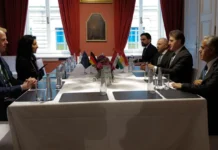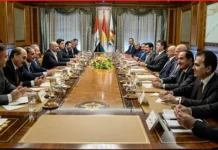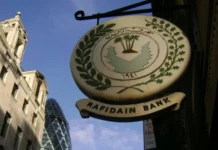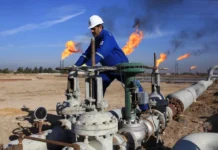Deposit Growth Declines And Cash Credit Rises In Iraq
Energy and Business 2025-10-22 Shafaq News – Baghdad The Central Bank of Iraq reported on Wednesday a decline in bank deposit growth, while credit growth increased during July.
A bank statistic reviewed by Shafaq News Agency showed that total deposits at banks operating in Iraq decreased by 1% in July, reaching 116.265 trillion dinars, compared to their value in June, which amounted to 117.439 trillion dinars.
The bank added that central government deposits amounted to 36.22 trillion dinars, while public institution deposits amounted to 25.442 trillion dinars, and private sector deposits amounted to 54.595 trillion dinars.
The statistics indicated that credit growth increased by 2% in July, reaching 73.027 trillion dinars, compared to June, when credit growth reached 71.483 trillion dinars.
The bank explained that credit provided to the central government amounted to 25.77 trillion dinars,
while credit provided to public institutions amounted to 2.43 trillion dinars, and credit provided to the private sector amounted to 44.827 trillion dinars. https://shafaq.com/ar/اقتصـاد/تراجع-نمو-الودا-ع-وارتفاع-الا-تمان-النقدي-في-العراق
Al-Ghariri: Iraq’s negotiations to join the World Trade Organization are ongoing.
Yesterday, 18:47 Baghdad – INA Minister of Trade Athir Dawood Al-Ghariri confirmed on Monday that Iraq’s negotiations to join the World Trade Organization are ongoing, while stating that regional cooperation and integration are the path to achieving peace, stability, and sustainable development.
A statement by the Ministry of Trade received by the Iraqi News Agency (INA) stated:
“Minister of Trade Athir Dawood Al-Ghariri participated in the sixteenth session of the United Nations Conference on Trade and Development (UNCTAD), held in Geneva with broad participation from representatives of countries and international and regional organizations.”
According to the statement, the minister affirmed that “collective action and regional integration represent a fundamental pillar for building a more stable and equitable economic system in light of the transformations and challenges facing the world,” emphasizing that “open regional agreements can support the multilateral trading systemand promote sustainable development.”
Al-Ghariri pointed out that “Iraq, which is continuing its negotiations to join the World Trade Organization, views regional initiatives as an opportunity to enhance its institutional readiness and align its legislative and investment frameworks, enabling it to effectively integrate into the global economy.”
He explained that “regional integration represents a pillar for development and reconstruction, and that cooperation in the areas of infrastructure, simplifying customs procedures, encouraging investment, energy, agriculture, and services contributes to enhancing competitiveness and diversifying the national economy.”
At the end of his speech, the Minister praised UNCTAD’s significant role in supporting Iraq during its accession to the World Trade Organization, stressing that “regional cooperation and integration are the path to achieving peace, stability, and sustainable development.” https://ina.iq/ar/economie/246099-.html
An Economist Explains: Iraq Can Write Off 90% Of Its “Odious” Debt.
October 21, 2025 Baghdad/Iraq Observer Today, economic expert Nabil Al-Marsoumi revealed new details regarding Iraq’s foreign debt,asserting that Iraq has the legal right to write off approximately 90% of these debts, which he considered “odious.”
Al-Marsoumi explained, in a post on his official Facebook page, that Iraq’s total external debt amounts to $54 billion, of which $13.5 billion is active debt, on which the government is paying interest, and $40.5 billion is inactive debt owed to Gulf states, frozen without interest payments and unsettled since the 1990s.
He pointed out that the total amount of these debts does not exceed $18 billion, of which $12 billion is owed to Saudi Arabia and $6 billion to Kuwait, while the remaining claims represent a mixture of several components:
1. Exporting oil to Iraq through the neutral zone between Saudi Arabia and Kuwait, at a quantity of 1.3 million barrels per day.
2. Paying off Iraq’s debts to others or guaranteeing loans, as Saudi Arabia helped the previous government to boost its creditworthiness.
3. Equipping Iraq with civilian and military means to serve the war effort, which were considered support rather than official loans.
4. Providing facilities at Saudi and Kuwaiti ports and exemptions from transit fees and customs clearance, including the construction of a pipeline to transport Iraqi oil through Saudi territory.
Al-Marsoumi emphasized that these components do not constitute legal debts unless there is a written agreement, and that the legal principle of odious debt allows for the cancellation of obligations that are not used to serve the public.
He pointed out that the optimal solution to these debts lies in establishing an international arbitration court to separate legal debts from odious debts, which would enable Iraq to pay only about 10% of the legal debts, and cancel the remainder, thus freeing the country from its large external debts. https://observeriraq.net/خبير-اقتصادي-يوضح-بإمكان-العراق-إسقاط-9/
Economist: Domestic Debt Is A Tragedy, And External Debt Is The Most Dangerous.
Economy October 18, 19:09 Information / Special.. Economist Ahmed Abd Rabbuh confirmed on Saturday that Iraq’s internal and external debts have reached alarming levels that threaten the country’s financial and economic stability.
He warned that continued borrowing without genuine financial reforms will lead to a crisis of confidence between citizens and banking institutions.
In a statement to Al-Maalouma News Agency, Abdel Rabbo said, “Domestic debts represent a true economic tragedy because they are financed by the local banking system, which weakens citizens’ confidence in banks and raises fears that their balances or savings will be affected if the crisis worsens.”
He explained that “external debts are the most dangerous because they subject the country to external political and economic conditions that limit its financial sovereignty.”
He added that “the continued accumulation of domestic debt without regulating government expenditures or a clear plan to direct them toward productive development projects poses a direct threat to the national economy,” noting that “the continued delay in approving budgets has exposed weak government performance and the failure to hold accountable those who have exceeded constitutional deadlines for the general budget.”
Abdul Rabbo pointed out that “it is unlikely that a new budget or financial schedules will be approved for the current year in light of the lack of real accountability and the decline in oil prices, which will lead to the disruption of investment projects and a slowdown in economic growth.”
This warning comes at a time when the government is facing a stifling financial crisis resulting from mounting debt and declining oil revenues, while economic experts are calling for a comprehensive reform of fiscal policy and enhanced oversight of public spending before the country slides into a deeper economic crisis.
https://almaalomah.me/news/113187/economy/اقتصادي:-الديون-الداخلية-مأساة-والخارجية-الأخطر
For current and reliable Iraqi news please visit: https://www.bondladyscorner.com






